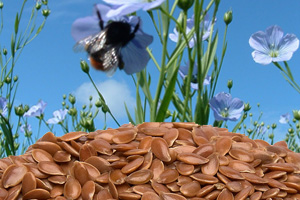What Is Flax Seed?

Flaxseeds have become a popular addition to many people’s diets, but what is flax seed and why the interest in flax seeds? The interest in flax seeds has skyrocketed because flax seed benefits are numerous and you can check out the link to find out what they are.
Flax seeds are the seeds produced by the flax plant, which is also known as common flax or linseed. There are two types of naturally growing flax seeds, brown flax seeds and yellow or golden flax seeds also known as golden linseed.
Brown flax seeds and golden linseed have similar nutritional characteristics and are equally high in omega-3 fatty acids. The is another yellow flax seed named solin, which is trademarked “Linola,” that was was made 1990’s to contain low amounts of omega-3 fatty acids.
Both the brown flax seed and the golden linseed have been eaten as far back as thousands of years from Egypt to India to China. Flax seeds have been roasted and added to foods like rice. People now add flax seeds to cereals, cakes, oatmeal, and cookies.
Flax seeds are also used to make flax seed oil or linseed oil. Linseed oil is one of the oldest commercial oils used as a drying oil in paints and varnishes.
Flax Seed Storage
The shell of the whole flax seed protects the oil inside of the seed from oxidation. Oxidation of the oil can quickly turn the flax seed rancid within a week when stored at room temperature. Since the whole flax seed has its protective shell, whole flax seeds can be stored in bags or containers at room temperature.
Ground flax seeds should be kept refrigerated in sealed containers to protect the exposed oil from oxidation. Sealed and refrigerated ground flax seeds can last for weeks in comparison to going rancid within a week being stored at room temperature.
Flax seeds nutrition and benefits are an excellent addition to a plant based diet as well as conventional diets.
Tags: flax plant, flax seed plant, what is flax seed






